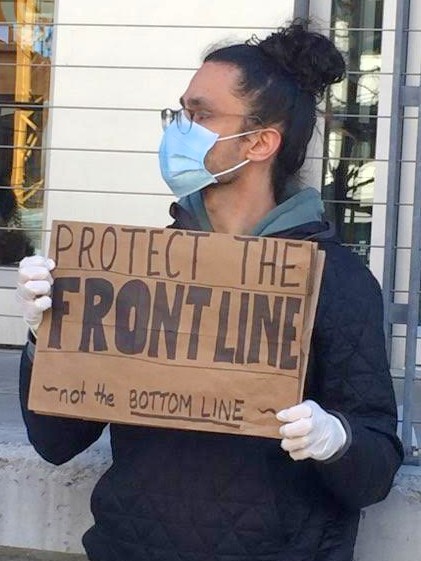

Boston grocery workers demonstrate outside Whole Foods, April 7.Credit: Maureen Skehan
A grassroots coalition of grocery workers from Whole Foods Markets, Stop & Shop, Trader Joe’s and Shaw’s supermarkets held a well-organized “social distancing” protest and press conference April 7 in front of Whole Foods in Boston’s gentrified South End. Their demands included “essential pay for essential work,” paid sick leave and family leave, time and a half hazard pay, and immediate, on-the-job protections, including face masks and gloves for all workers, stringent disinfectant protocols and social distancing guidelines.
Boston grocery workers demonstrate outside Whole Foods, April 7.Credit: Maureen Skehan
Calling out Amazon’s owner Jeff Bezos, the world’s richest billionaire, one worker said, “It’s criminal that the richest corporation in the history of our planet is refusing to pay its workers more than $2 dollars per hour for hazard pay and is not providing its employees with adequate protective equipment. This is not enough! Amazon can afford it!” (tinyurl.com/rpjjjls/) Amazon owns Whole Foods.
Lisa Wilson, who works as a cashier at Shaw’s in the working-class neighborhood of Hyde Park, shared using a bullhorn, “I feel scared. I feel like I’m going to get sick. I feel like it’s inevitable. But at the same time, not working is not an option. With my insurance, if I get sick, it’s going to be hard. The idea that I have to put my life on the line is crazy.”
Demonstrations by grocery workers, fighting for their very lives, have begun to extract critical worker protections and compensation from the grocery bosses, including the right to employer-provided protective gear. A new statewide guideline in Massachusetts allows no more than 40 percent of maximum store occupancy and adds to earlier mandates for single-lane shopping and social distancing protocols in grocery stores at all times. Some grocers are also bending to demands for improved hazard pay, raising recent wage increases above the $2 an hour pittance that Amazon’s Whole Foods has insultingly offered.
Over 40 grocery workers have died from COVID-19. The first in Massachusetts was Vitalina Williams, who died April 4 at 59. She worked two part-time cashier jobs: at Market Basket in Salem and Walmart in Lynn. Williams migrated to the U.S. in the 1990s from a poor Mayan community in Tecpán, Guatemala, to support her mother and nine siblings back home and to better her own life economically.
Sadly, her brother noted, Vitalina’s tragic and preventable death “shows that there are two hugely unequal worlds.” Following her death, state elected officials applied pressure on Gov. Charlie Baker to declare grocery workers “emergency workers.”
Williams is survived by her husband of 22 years, Dave Williams, who also worked at Market Basket. “She was not the love of my life. She was my life,” he said.
Any gains won by grocery workers are gains for us all!
Download the PDF. Download B&W version. Hamas calls for April 18-20 global solidarity editorial: Political…
April 13 – The heroic Palestinian resistance to occupation, apartheid and genocide continues to cause…
Seattle -- Hundreds of “Hands Off Gaza” demonstrators crowded the streets of downtown Seattle on…
7 de abril Desde el 2 de abril, el mercado de valores estadounidense ha perdido…
The following call, “Gaza cries out to you – A global solidarity week to support…
Ever since the Donald Trump/Elon Musk administration took the reins of power in late January,…